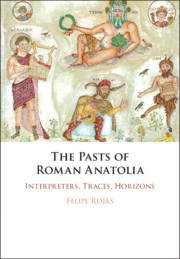Refine search
Actions for selected content:
5930 results in Classical art and architecture
Bibliography
-
- Book:
- The Pasts of Roman Anatolia
- Published online:
- 04 October 2019
- Print publication:
- 17 October 2019, pp 217-240
-
- Chapter
- Export citation
Two - Interpreters
-
- Book:
- The Pasts of Roman Anatolia
- Published online:
- 04 October 2019
- Print publication:
- 17 October 2019, pp 18-60
-
- Chapter
- Export citation
Dedication
-
- Book:
- The Pasts of Roman Anatolia
- Published online:
- 04 October 2019
- Print publication:
- 17 October 2019, pp v-vi
-
- Chapter
- Export citation
Acknowledgments
-
- Book:
- The Pasts of Roman Anatolia
- Published online:
- 04 October 2019
- Print publication:
- 17 October 2019, pp xvii-xviii
-
- Chapter
- Export citation
Six - The Past in Things: Ancient Archaeophilia and Modern Archaeology
-
- Book:
- The Pasts of Roman Anatolia
- Published online:
- 04 October 2019
- Print publication:
- 17 October 2019, pp 180-186
-
- Chapter
- Export citation
Maps
-
- Book:
- The Pasts of Roman Anatolia
- Published online:
- 04 October 2019
- Print publication:
- 17 October 2019, pp xii-xiii
-
- Chapter
- Export citation
Frontispiece
-
- Book:
- The Pasts of Roman Anatolia
- Published online:
- 04 October 2019
- Print publication:
- 17 October 2019, pp xiv-xiv
-
- Chapter
- Export citation
One - Introduction
-
- Book:
- The Pasts of Roman Anatolia
- Published online:
- 04 October 2019
- Print publication:
- 17 October 2019, pp 1-17
-
- Chapter
- Export citation
Copyright page
-
- Book:
- The Pasts of Roman Anatolia
- Published online:
- 04 October 2019
- Print publication:
- 17 October 2019, pp iv-iv
-
- Chapter
- Export citation
Note on Cover Illustration
-
- Book:
- The Pasts of Roman Anatolia
- Published online:
- 04 October 2019
- Print publication:
- 17 October 2019, pp xv-xvi
-
- Chapter
- Export citation
Maps
-
- Book:
- The Pasts of Roman Anatolia
- Published online:
- 04 October 2019
- Print publication:
- 17 October 2019, pp xix-xxii
-
- Chapter
- Export citation
Five - Beyond Anatolia
-
- Book:
- The Pasts of Roman Anatolia
- Published online:
- 04 October 2019
- Print publication:
- 17 October 2019, pp 144-179
-
- Chapter
- Export citation
Index of Ancient Sources
-
- Book:
- The Pasts of Roman Anatolia
- Published online:
- 04 October 2019
- Print publication:
- 17 October 2019, pp 241-243
-
- Chapter
- Export citation
Contents
-
- Book:
- The Pasts of Roman Anatolia
- Published online:
- 04 October 2019
- Print publication:
- 17 October 2019, pp vii-viii
-
- Chapter
- Export citation
Notes
-
- Book:
- The Pasts of Roman Anatolia
- Published online:
- 04 October 2019
- Print publication:
- 17 October 2019, pp 187-216
-
- Chapter
- Export citation
Four - Horizons
-
- Book:
- The Pasts of Roman Anatolia
- Published online:
- 04 October 2019
- Print publication:
- 17 October 2019, pp 104-143
-
- Chapter
- Export citation

The Pasts of Roman Anatolia
- Interpreters, Traces, Horizons
-
- Published online:
- 04 October 2019
- Print publication:
- 17 October 2019
10 - Architecture and Planning in Asia Minor
-
- Book:
- Roman Architecture and Urbanism
- Published online:
- 21 August 2019
- Print publication:
- 05 September 2019, pp 597-706
-
- Chapter
- Export citation
12 - The Late Empire in Rome and the Provinces
-
- Book:
- Roman Architecture and Urbanism
- Published online:
- 21 August 2019
- Print publication:
- 05 September 2019, pp 800-862
-
- Chapter
- Export citation
2 - Temple Architecture of Republican Rome and Italy
-
- Book:
- Roman Architecture and Urbanism
- Published online:
- 21 August 2019
- Print publication:
- 05 September 2019, pp 81-111
-
- Chapter
- Export citation
